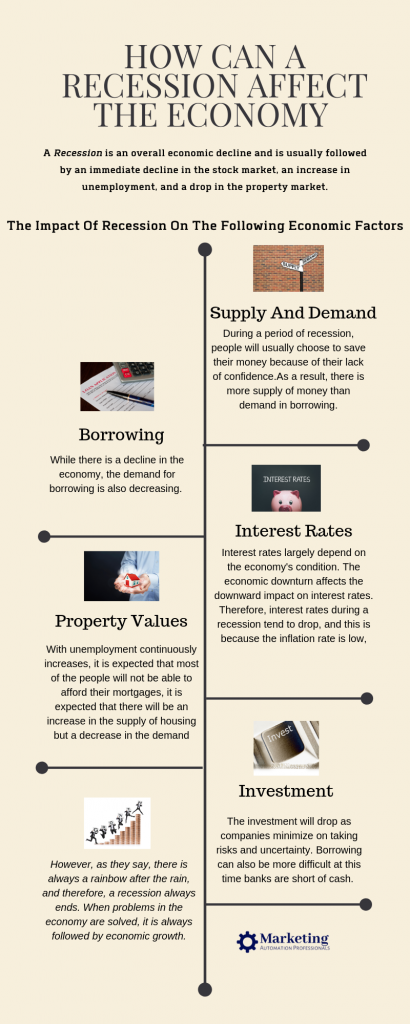
It is a term of an overall economic decline and is usually followed by an immediate decline in the stock market, an increase in unemployment, and a drop in the property market. A recession is normally less serious than depression. It is a decrease in economic activity over a certain period of time.
Though the Central Bank has other means to adjust the interest rate, it still doesn’t have full control of it. The laws of supply and demand are reasonably affected by interest rates. During a period of recession, people will usually choose to save their money because of their lack of confidence.
Most people usually are expecting to lose their jobs so they hesitate to spend or borrow, and instead, they chose to borrow. As a result, there is more supply of money than demand in borrowing. During a period of recession, a paradox of thrift is deemed, it is because the consumers chose to save their money rather than use it for consumption, and this causes the recession to get worse.
It is not a bad thing to save, however, if all people chose to save, they further limit the decision of consumers to spend, thus it makes the recession more severe.
While there is a decline in the economy, the demand for borrowing is also decreasing. A lack of demand drives interest rates to decline. Furthermore, the monetary policy employed by the central bank in times of recession is to increase the supply for money to reduce interest rates. Low-interest rates boost economic activity through consumer spending and investment in business and cheaper financing with low-interest rates.
Interest rates largely depend on the economy’s condition.
When there is economic growth, the demand for money increases, and it influences the interest rate to drive upwards.
On the other hand, the economic downturn affects the downward impact on interest rates. Therefore, interest rates during a recession tend to drop, and this is because the inflation rate is low, and the central bank would like to deal with and encourage the economy.
Essentially, lower interest rates should help the economy from recession, as it reduces the cost of borrowing, and it should promote investment and consumer spending.
During a recession, with unemployment continuously increases, it is expected that most of the people will not be able to afford their mortgages, and therefore we can observe home repossessions. In this situation, an increase in the supply of housing but a decrease in the demand is expected.
The investment will drop as companies minimize on taking risks and uncertainty. Borrowing can also be more difficult at this time banks are short of cash.

It comes, and it goes, that is what recession is all about. There are periods of recessions that are more severe and last longer than the others. However, as they say, there is always a rainbow after the rain, and therefore, a recession always ends. When problems in the economy are solved, it is always followed by economic growth.
Session expired
Please log in again. The login page will open in a new tab. After logging in you can close it and return to this page.